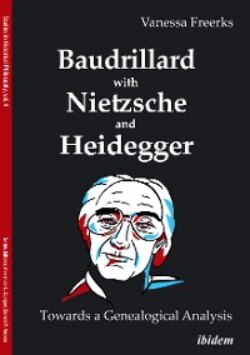Описание книги
Baudrillard with Nietzsche and Heidegger: A Contrastive Analysis is essential reading for students and scholars of continental philosophy, sociology, and cultural theory.

Реклама. ООО «ЛитРес», ИНН: 7719571260.
Acknowledgements
Abstract
Introduction
Chapter Outline
1. The Morality of Consumption: Reading Baudrillard’s Consumer Society with Nietzsche’s On the Genealogy of Morals. Introduction
1.1 Baudrillard Reading Nietzsche
1.2 Baudrillard’s critical semiology
1.3 Aristocratic and Slave Narratives
Conclusion
2. Processes of Subjection and the Figure of the Ascetic Priest. Introduction
2.1 The Genesis of the Subject
2.2 Economies of Debt and Exchange in Nietzsche and Baudrillard
2.3 The “Liturgy of Solicitude”
2.4 Ascetic ideals and consumer society
Conclusion
3. The End of Transcendence in Consumer Society. Introduction
3.1 Wasteful Expenditure
3.2 Ascetic consumption
3.3 Pseudo-Events in Consumer Society
Conclusion
4. The Reversal of Platonism. Introduction
4.1 The Reversal of Platonism
4.2 The Simulacrum and the Motivation for Plato’s Method of Division
4.3 Baudrillard’s Simulacrum
Conclusion
5. Hyperreality of Simulation. Introduction
5.1 Genealogy of Simulacra
5.2 The Hyperreal Structural Law of Value
5.3 The Causes of Simulation
5.3.1 Simulation as an economic effect
5.3.2 Simulation as media effect
5.3.3 Simulation and the Death of God
Conclusion
6. Baudrillard and Heidegger: Towards a Genealogy of Death. Introduction
6.1 Death and Subjectivity
6.2 Baudrillard (Re-)socializing Death
6.3 Beyond death as natural fatality
6.4 (Re-) Situating Heidegger and Baudrillard
Conclusion
Concluding Remarks and Summary of the Study
7. Bibliography
ibidem Press, Stuttgart
I am most indebted to my PhD supervisor, Rafael Winkler, who has consistently supported me to pursue my projects amidst adversity and who now named me his research associate at the University of Johannesburg. The exchanges and rich conversations with him helped to clarify a number of issues regarding Nietzschean genealogy and the intricacies relating to Heidegger’s conception of death.
.....
In Hanlon’s view, Baudrillard’s analysis of Heidegger as subject-centred leads him away from the situatedness (Befindlichkeit) entailed in the Jemeinigkeit of death. For Hanlon (2004, 524), Baudrillard places all the emphasis on the contingent and the aleatory and regards “his theorising as somehow outside any structural conception of temporality and history – in a sense ahistorical”. Hanlon (2004, 513) claims that Baudrillard takes on an approach that revolves around “pure critique” rather than the proposition of “alternative structures” which can be critiqued. Hanlon uses Heidegger to claim that this leaves us with a conception of subjectivity that does not take account of our “situatedness” in a temporal framework. According to Hanlon,
“[t]he aporia concerning ‘situatedness’ in Baudrillard is clearly an aporia concerning Baudrillard’s approach to history, historicity and temporality. It may be understood as a weakness in Baudrillard’s theorizing in as much as if he is employing a Heraclitean ontology of flux, implying a conception of temporality along the lines of Nietzschean Werden and with his concept of reversibility being explicitly related to Nietzsche’s notion of ‘eternal recurrence’, then there must be an acceptance that identity implies difference, that the eternal recurrence of the same also implies the absolute particularity of a moment and vice versa” (Hanlon 2004, 524).
.....